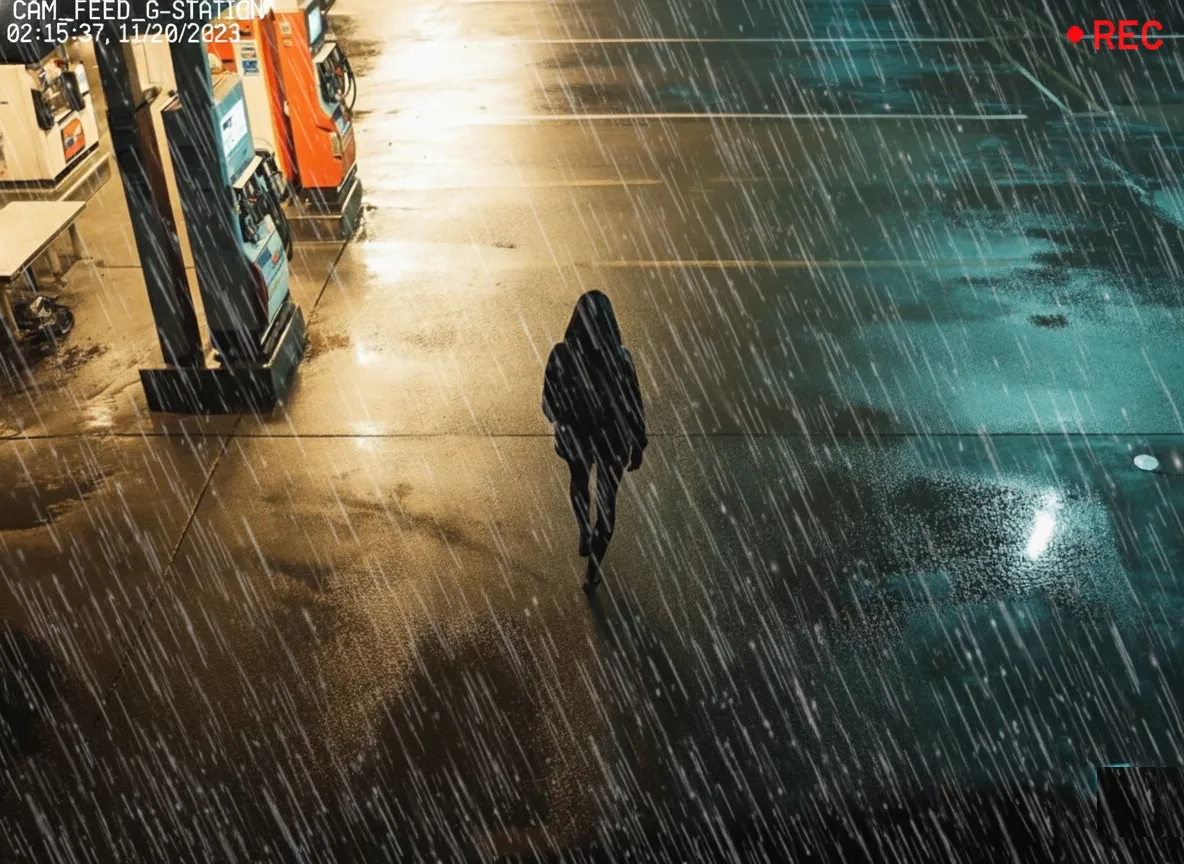Richard Hale, self-starter and CEO of a well-to-do firm, loved a good joke. But he also had one major flaw: he did not know where to stop. For him, the line between a joke and cruelty was often blurred. When Adeline stepped out of the car to stretch her legs at the gas station, he smirked, shifted gears, and rolled forward a few feet.
“Come on,” he called. “Keep up.”. She frowned, half-laughing, thinking he was only teasing. Then he accelerated just enough to make her jog after him. The sound of her calling his name followed him into the dark, swallowed by the noise of rain and engine. The thrill was intoxicating. She’d soon be furious, then she’d forgive him. She always did in the end.
In the rearview mirror, he watched her grow smaller, a shape under flickering fluorescent lights. He almost stopped, but didn’t. A lesson, he told himself, maybe she’d finally learn not to take herself so seriously. He drove away humming to the rhythm of the wipers, proud of his own wit…
Ten minutes later, his phone buzzed once. It was a call from her. He sniggered but did not pick up. Predictable. He’d let her stew a bit longer, just enough to make her realize how dependent she’d become. He pictured her pacing, cheeks flushed, ready with that familiar half-angry, half-conceding attitude when he returned.

But the second call never came again. He checked the screen twice, expecting the message, her plea. Nothing. Just the faint sound of rain against the windshield. He turned on the radio to fill the silence, but the static only made it louder.
Half an hour later, irritation replaced amusement. “Really?” he muttered. “Now she’s going silent on me?” He called her once, twice, and then ten times. It went straight to voicemail. He imagined her sulking, making a point. He almost admired the defiance. Then something colder began to stir beneath his annoyance.

He turned the car around. The highway stretched empty in both directions, the storm thinning to mist. Every mile back felt longer than it should have. He told himself she’d be there, waiting, arms crossed, ready to shout at him. He rehearsed the apology he’d never mean.
The gas station came into view. It was a pool of white light in the dark. His headlights swept across the lot. It was empty. There was no figure by the pumps, and no shadow under the awning. His chest tightened a bit as the engine idled. He honked once, absurdly, as if she might appear.

He parked and stepped out. By now, he was feeling a little nervous. The air smelled of wet asphalt and oil. “Adeline!” he called. Nothing. The attendant inside barely looked up from the counter. “You saw the woman here earlier?” Richard asked. The boy nodded slowly. “Yeah. She walked off that way. Was crying. Looked upset.”
Richard followed the gesture toward the dark road beyond the lot. His shoes splashed through shallow puddles. “She wouldn’t just walk off,” he said aloud, as if someone were listening. His voice sounded foreign, hollow. Somewhere above, the CCTV camera blinked red. Watching and recording everything.

He forced a laugh, brittle and humorless. “I bet she’s trying to get back at me,” he told the attendant, though it sounded like he was trying to convince himself. “We’ll both laugh about this tomorrow.” The boy said nothing, eyes flicking to the camera and back to him.
Richard climbed back into the car and sat there, staring at the glowing station lights in his mirrors. He tried calling again. There was still no answer. His reflection stared back from the windshield—the confident man replaced by something smaller and uncertain. “She’ll be fine,” he whispered, but the hammering in his chest disagreed.

By morning, the dread was undeniable. He hadn’t slept, waiting for her to call or walk through the door with that quiet fury she always carried after his “jokes.” But the phone stayed silent. Her friends hadn’t heard from her. Even her sister hadn’t. For the first time, Richard felt real fear. What if his stupid prank had led her to some danger?
At the police station, the air smelled of stale coffee and disinfectant. He explained what happened, trying to keep his voice steady. “It was supposed to be a joke,” he said. “I came back, but she was gone.” The officer across the desk raised an eyebrow. “You left your wife on the highway at night—as a joke?”
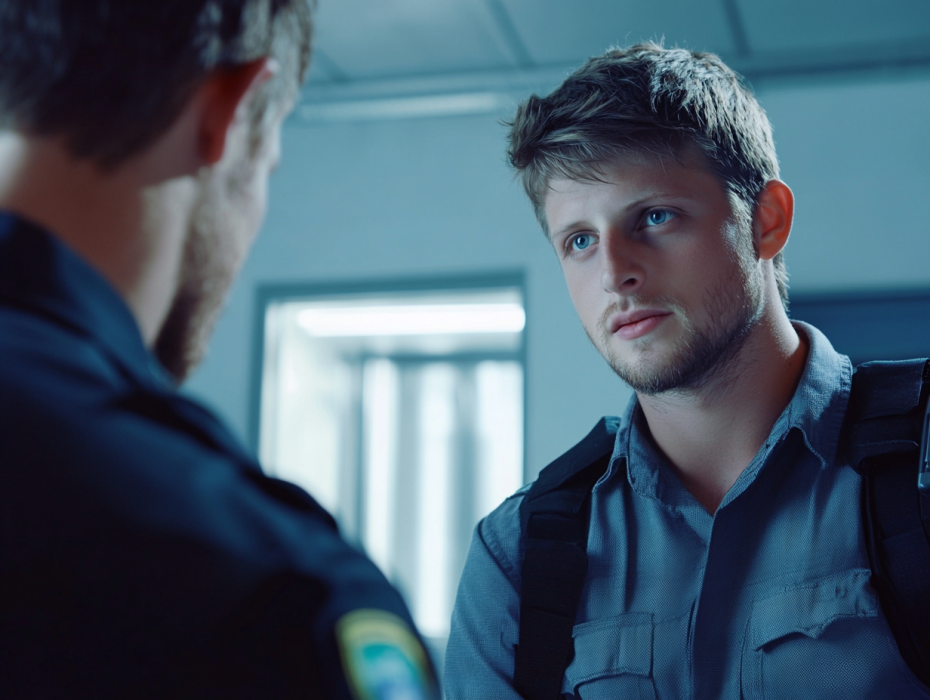
He stumbled through the details—time, gas station, and phone calls. Everything made him look worse. The officer’s pen scratched slowly against the report. After an hour, another officer came, folding his arms. “Strange thing,” he said. “We pulled the CCTV. She left on foot, crying. You didn’t report her missing until now?” The silence that followed was heavier than guilt.
By noon, the police were back at his house. Questions layered over questions—same ones, different tones. “When did you last see her?” “Why did you wait to call?” “Were you arguing?” Richard kept repeating the same line: “It was just a prank. A stupid prank.” Each time, it sounded less convincing.

Outside, cameras waited. Reporters shouted his name as he stepped through the station doors, their microphones like bayonets. “Mr. Hale, did you abandon your wife?” “Where is she now?” His PR manager barked for space, hustling him into a car. “Stay calm,” she whispered. “Say nothing.” But silence felt like guilt.
He repeated it under his breath the whole time: It was just a prank. As if words could rewind time, erase the grainy CCTV, and stop her walking away. Each repetition felt emptier than the last, until even he stopped believing himself. He knew if something had happened to her, his life as he knew it would be over.

By evening, the internet had turned the story into a storm. Thousands of posts dissected the timeline. One tweet read: “He waited ten hours. No one waits ten hours.” Another: “You don’t joke about abandoning someone.” His inbox was filled with threats and accusations. Strangers called him a monster and a coward.
News anchors replayed the footage in slow motion, frame by frame: her stepping back, her arms crossed, her head shaking before she walked off into the rain. “What happened next?” they asked on loop. He didn’t know anymore. One thoughtless joke has ballooned out of proportion.
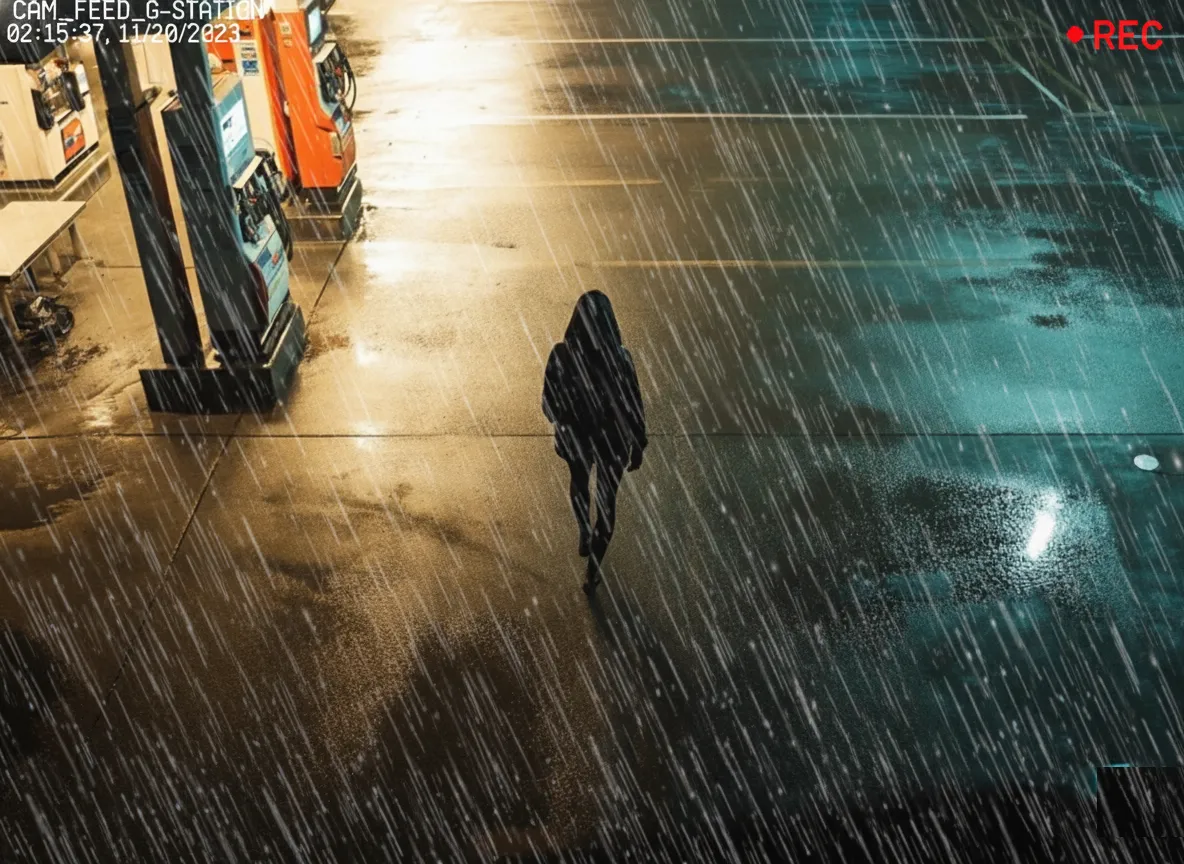
His PR team told him to stay offline for a few days, to wait it out, but he couldn’t resist searching his name. Every headline dripped with contempt: “Gas Station Husband Under Fire.” “Missing Wife, Viral Joke.” The comments blurred together until they all suggested the same theory: He must’ve done something to her. He must’ve got rid of her.
That night, sleep brought flashes of memory—their last dinner together, her quiet laughter that died mid-sentence when he mocked her in front of guests. “Don’t sulk,” he’d said. “People like you better when you smile.” He remembered her smile that night—thin, forced, and already breaking.

He saw her again, at the airport months earlier, suitcase in hand, threatening to visit her sister. He’d called her dramatic, childish, unstable. “You’ll come crawling back. You’ll never find someone as good as me,” he’d told her. She had too, every time, after every fight. Until now.
And then came the final memory: the look on her face as he rolled down the window that night. He imagined what he saw there was neither fear nor anger—just a calm, hollow distance, as if she’d already decided this was the last time she’d let him humiliate her. He couldn’t really vouch for his memory anymore, though.

In the days that followed, detectives came and went. He showed them call logs, text messages, and receipts. “See?” he said. “I tried to find her.” But they only nodded, jotting notes. Her phone had last pinged near the highway shoulder. After that, there was nothing—it was as if she had vanished into the night.
They searched nearby woods, drainage ditches, and truck stops. Volunteers gathered with flashlights and dogs. He joined them once, mostly to play the part of the grieving husband, but his presence made everyone uneasy. One officer whispered to another. He caught the look in their eyes. They looked at him with suspicion.
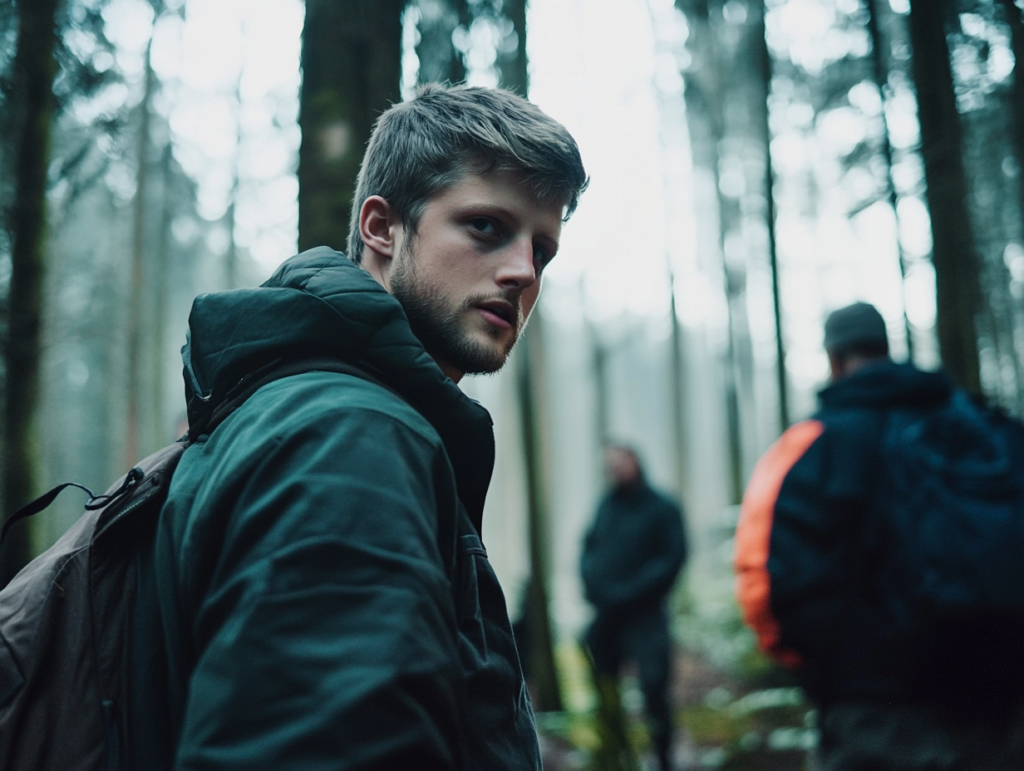
Days bled into one another as search teams came and went. Drones scanned the woods, volunteers combed through ditches, but nothing surfaced—not a footprint, not a thread. When the officers finally packed up their gear, Richard stood by helplessly, realizing he was the only one still looking.
Three weeks later, the investigation slowed. Without a body or a sign of foul play, there was nothing to charge him with. The police called it an “open case.” They had more urgent crimes to deal with. For Richard, it was a nightmare without an ending.

The incident affected him in other ways, too. Neighbors stopped waving. Colleagues avoided him. He couldn’t walk into a grocery store without someone whispering. The question was everywhere—in headlines, in whispers, and in his own head: What did you do to her?
He had escaped prison, it was true, but he was trapped all the same. The world didn’t need evidence. It had the story it wanted. And Richard Hale, once untouchable, had become the primary antagonist of his own life.

Sleep became impossible. Every creak in the house, every hum of the refrigerator sounded like her voice calling out to him. Sometimes he saw her in danger, at other times, she was leaving him mockingly. He wandered through their home at night, stopping at her side of the bed, at the mirror where she used to get ready. The silence was merciless.
His company called within the week. The board wanted him to “take some personal time.” Polite phrasing for exile. “This isn’t permanent,” they said. “We just need distance.” Sponsors pulled their contracts overnight. Investors vanished. The empire he built on charm was collapsing faster than his denial could patch it.

He spent his days pacing through rooms that smelled like her perfume, now faint, ghostly. Her slippers still sat by the door. Every object was a trap—her handwriting on grocery lists, a lipstick stain on a mug. He couldn’t decide which hurt more: her continued absence or the evidence of having been here once.
He tried to distract himself with work, but his mind kept rewinding. Italy, two years ago. He’d left her at the hotel after she misplaced their passports. “You’re careless,” he’d shouted. “Figure it out.” He spent two days drinking by the pool while she cried herself through foreign bureaucracy.

When she finally returned, shaken, he’d laughed it off. “See? You managed. I made you stronger.” The way she’d smiled then haunted him now; had it been too quiet, too practiced—was it the look of someone rehearsing her survival? But she had come back then. What if something had happened to her this time?
He told himself she was out there somewhere, starting over, punishing him by disappearing. It was easier to believe in her vengeance than in her death. But even vengeance required communication, and she’d left him nothing—no note, trace, or clue. Just the echo of his own cruelty.

One gray morning, he drove back to the gas station, parking in the same spot. The attendant recognized him instantly. “You again?” the boy muttered. Richard forced a smile. “Did anyone ever come back asking about her?” The boy shook his head. “You’re kidding, right? The media were here every day, a week, after she was last seen.”
He finally decided to follow the direction she was last seen walking—an empty road, flanked by trees and fog. A trucker who’d been refueling nearby said the same thing: “She looked upset, but she was walking.” The words lingered. He couldn’t even tell if the man was lying. What if he had done something to her?

He stood by the roadside for an hour, watching cars pass. The wind carried the smell of fuel and rain. Somewhere beneath that, faintly, he thought he could still hear her voice calling his name, until he realized it was only the sound of his own breath catching.
Online, theories multiplied like weeds. Maybe she ran off. Maybe he buried her. Maybe they planned it together. Every post gnawed at him. He told himself he wouldn’t look again, but he couldn’t stay away. Every night, he scrolled through strangers dissecting his marriage like it was entertainment.

Some threads even sympathized with him—praising his composure, calling him misunderstood. He read those the most, clinging to them like a lifeline. But the comfort was short-lived; they were defending the man he used to be, not the one sitting awake at 3 a.m., terrified of mirrors.
He started hearing things—doors closing softly, footsteps on the stairs. Sometimes he’d wake thinking she was beside him, the pillow indented as if she’d just risen. He’d whisper her name into the dark and wait for a reply that never came. The silence had learned to mock him.

Weeks later, he hired two private investigators to look into the case. One quit after a month; the other sent photos of every woman with her build spotted in nearby towns. None was her. He printed missing posters anyway, though he hated seeing his own face beside hers on the news.
He appeared on television, pale and shaking, begging for information. “Please,” he said, “if you’ve seen her, contact the police.” The interviewer’s eyes stayed cold. Viewers called his performance a sham—that he was shedding crocodile tears. Even he didn’t know anymore whether the grief he showed was real or rehearsed.

The irony wasn’t lost on him. He had always mocked her emotions for years, calling her dramatic, sensitive, and fragile. Now he was all three, and on public display. The man who’d once thought humiliation was power was learning what it felt like to be its subject.
Richard spent entire nights watching their old videos on his phone—the birthdays, vacations, and quiet Sunday mornings. Adeline laughed in nearly all of them, but never at him. He paused the frames, looking closer. How had she never really protested at the taunts he’d thrown her way?

He moved on to the photos—hundreds stored in neat digital albums. In each one, he posed confidently while she leaned toward him just enough to complete the picture. It was a gallery of illusions, curated evidence of a happy life he had demanded she perform. He saw that now.
Sometimes he caught his own reflection in the dark screen when the video ended. He wondered if she had finally seen him the same way he did now—not a kind face, but one filled with pettiness and insecurity turned against others.
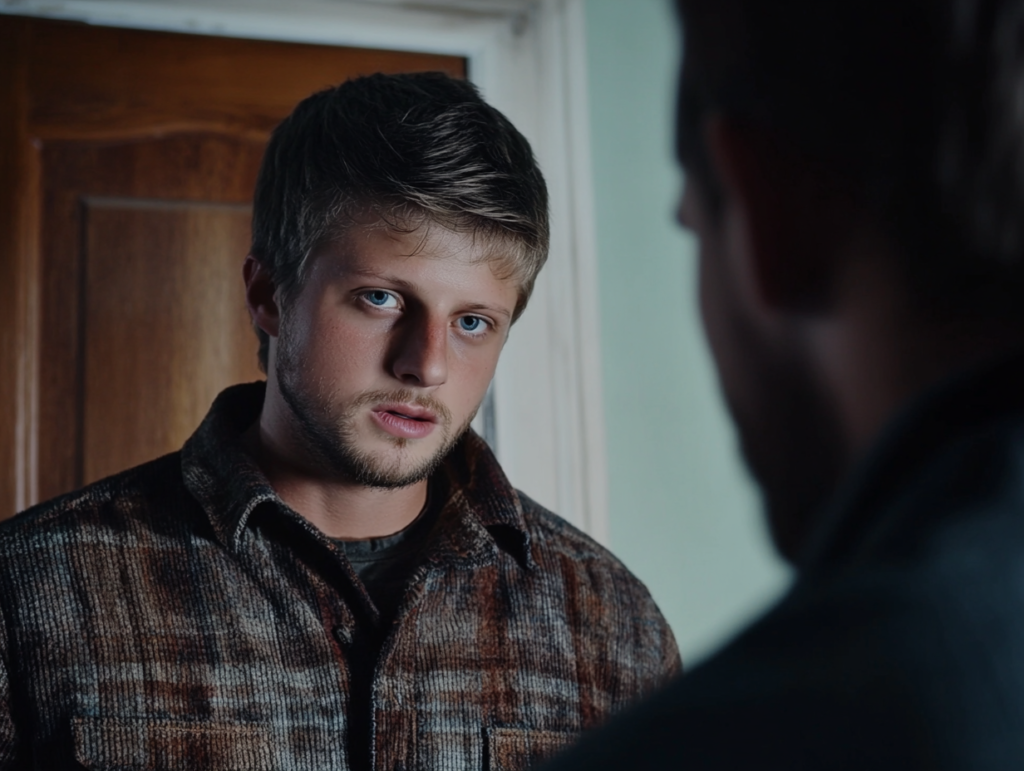
A detective stopped by one afternoon with an update that wasn’t one. “No new leads, Mr. Hale,” the man said, closing his notebook. Richard nodded, already used to the emptiness of that phrase. Then the detective hesitated, lowering his voice. “Sometimes,” he said, “they don’t want to be found.”
The words landed like a blow. He wanted to argue, to demand another search, but something inside him recoiled. Deep down, he understood what the detective meant. The thought hollowed him out. Maybe she hadn’t vanished. Maybe she’d escaped him. That made him wonder what sort of a man and husband he had been.

That night, he replayed the sentence over and over. They don’t want to be found. He whispered it until it became a rhythm, a punishment. The house seemed to absorb it, the walls echoing his confession back to him. Each syllable scraped something raw inside his chest.
At first, his guilt came from imagining her hurt somewhere—injured, lost, or waiting for him to find her. But as the days stretched on, the fear changed shape. What if nothing had happened to her at all? What if she’d simply walked away, free of him, and decided never to return? What would become of his life now?

Sleep came in fragments, each dream a distortion of memory. Sometimes she was knocking on the window, and sometimes sitting across from him at dinner, silent, her gaze unblinking. He’d wake gasping, drenched in sweat, whispering her name like a prayer that had no believer.
He stopped inviting people over. The few who visited said the house smelled like damp wood and grief. He unplugged the doorbell after one night when it rang once, sharply, at 3 a.m. He didn’t open the door. He didn’t need to. He knew it was either his brain or some pranksters—he couldn’t blame them. He had played such jokes not long ago.

By autumn, the world had moved on. Newsfeeds were filled with newer tragedies and fresh scandals. His face disappeared from the headlines. The silence should have felt like peace, but it didn’t. Oblivion was quieter than hatred, and infinitely colder. He had no one, and his life held no meaning.
He tried to step outside, to buy groceries, to talk to strangers. Some recognized him, most didn’t. That was worse. He’d become the kind of man people forgot even while looking at him. A ghost in plain sight.

Winter came, and with it, a kind of numbness. The house no longer felt haunted, just hollow. He stopped opening the curtains. Days blurred into gray shapes through frosted glass. Sometimes he caught himself listening for footsteps, then laughed bitterly. Even the ghosts, it seemed, had moved on.
One morning, he packed a single suitcase. The house, once his monument, had become a mausoleum. He walked through each room one last time, turning off the lights in silence, as though afraid to wake the dead version of himself still haunting it.
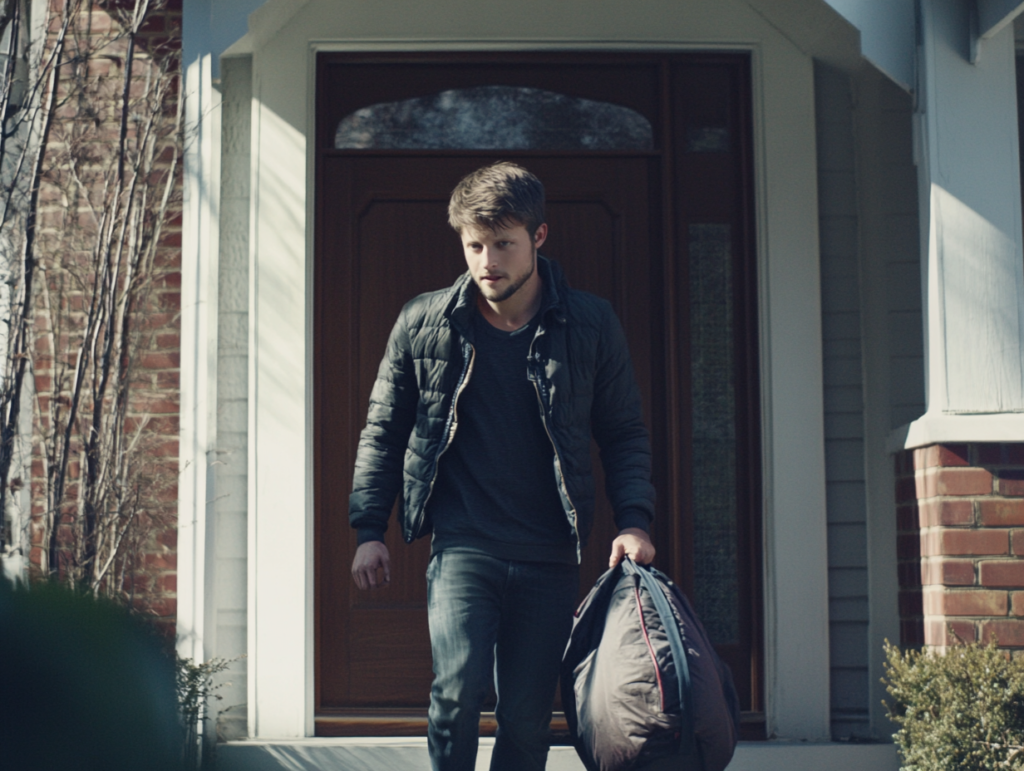
He sold the property for half its worth and drove until the road signs became unfamiliar. He had no destination in mind, just wanting to put some distance between himself and his past. In a small coastal town, he rented a modest apartment under a different name. The landlord didn’t recognize him, and he was grateful.
He told himself he was starting over. But guilt doesn’t need a passport. It travels light, fits easily in the chest, and never needs rest. Every night before bed, he still left the porch light on—a habit he couldn’t break. Some part of him still hoped she might come home.
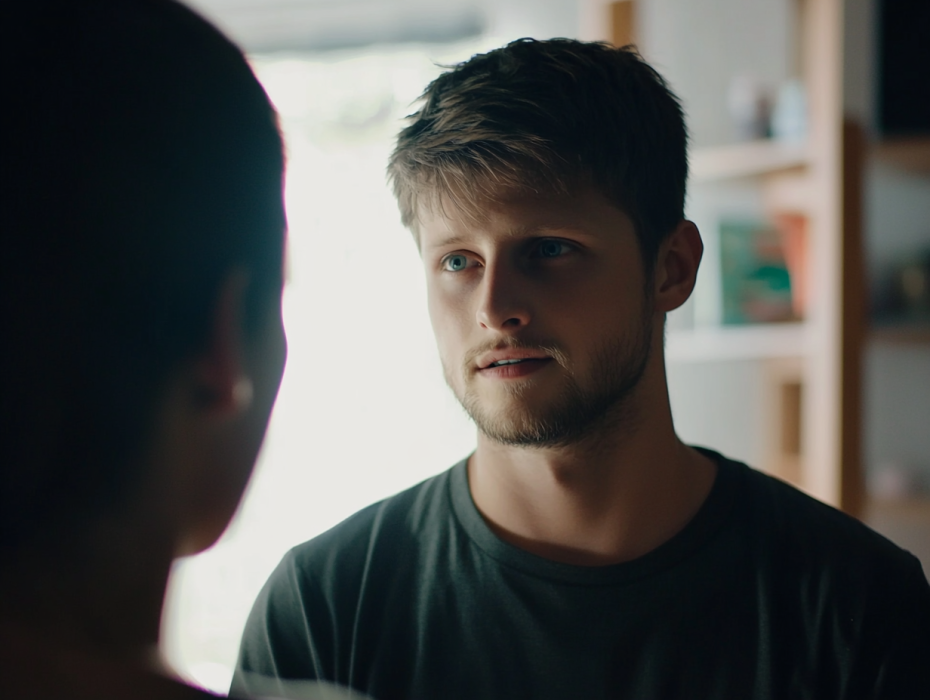
The coastal town didn’t care who he was. That was a mercy. Richard found work at a small accounting firm where no one recognized his face from old headlines. He kept his head down, spoke little, and made sure to leave before anyone could invite him for a drink.
He avoided mirrors and the news. The internet was a place for ghosts, and he’d already met his own. Every day felt like a penance measured in silence. For a man who once loved jokes, he found it hard to laugh. It seemed he had exhausted all his mirth. He had no one left to disappoint but himself.

Months passed, and anonymity began to feel like oxygen. The whispers were gone. The judgments, too. Yet beneath the stillness, something restless lingered—a sense of borrowed rather than earned peace. He wondered what would become of him.
One evening, he followed a coworker to a community shelter. The air smelled of soup and detergent, the hum of conversation low and tender. He wasn’t sure why he stayed—whether it was guilt or redemption, he couldn’t tell. But every thank-you he received felt like a confession.

He scrubbed dishes, folded blankets, and stacked crates of donations. The people there never asked questions. Some called him “sir,” some “friend.” Their kindness unsettled him. It was the simple, undeserved grace of being treated as if he still belonged to humanity.
After months of volunteering, he found a fragile rhythm again—work, the shelter, and long walks by the sea. Sometimes he almost believed he was healing, though he knew better than to trust the calm. Guilt and grief were a tide: even at low ebb, it always came back.

The dreams returned occasionally. It was always the same—Adeline standing at the gas station, rain streaking her hair, her eyes unreadable. At times, she looked scared witless, while at others she looked knowing and calm. She looked free then. He woke drenched in sweat, whispering her name into the dark like a prayer for the dead.
Every dawn felt like he was fighting to reclaim himself. He’d sit at the window, watching waves roll in, wondering about her. Some days, he convinced himself she must’ve died in some accident which was all his doing; on other days, he hoped she was living somewhere just to taunt him. Both thoughts hurt in equal measure.
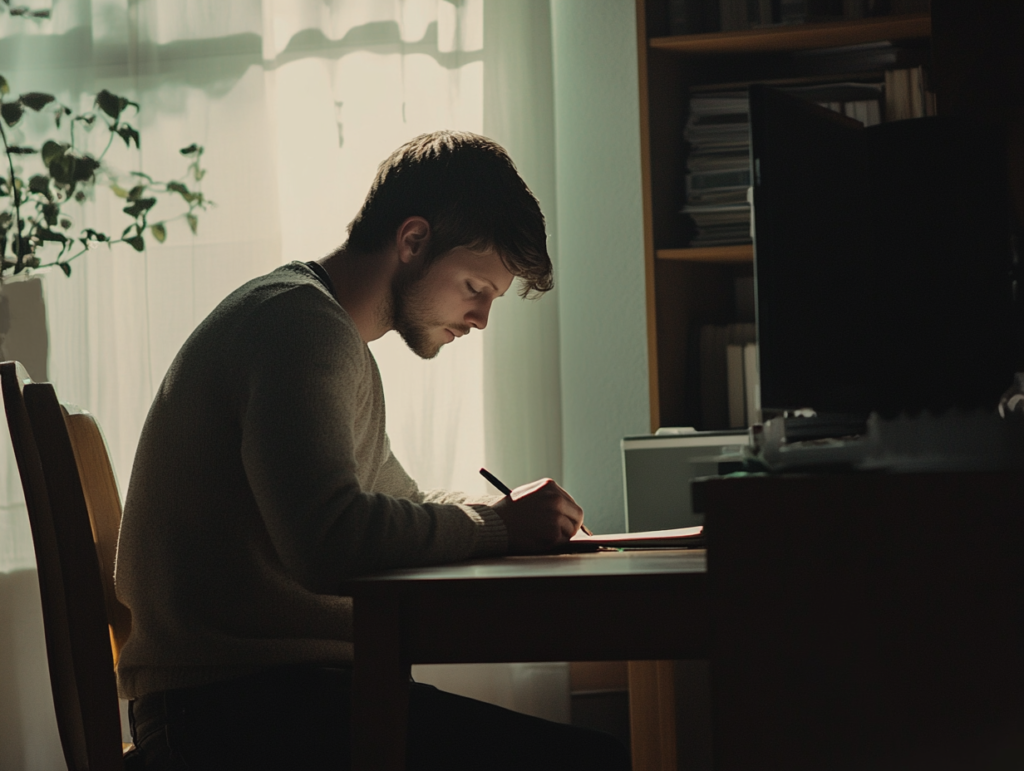
He wrote letters he never sent. “I didn’t mean it,” one began. Another ended with, “You were right to leave.” He burned them all in a metal bin behind the shelter, watching the smoke rise until it vanished into the same indifferent sky that had swallowed her.
Years softened the scandal, but not the memory. He was just another forgotten face now—the man who left his wife at a gas station. When he finally laughed again, over something inconsequential, the sound startled him. It felt like it belonged to someone else.

He tried dating once. She was a woman who worked at the shelter. It lasted two weeks. She said he seemed kind but unreachable, as if half his soul lived elsewhere. She wasn’t wrong. There were places inside him no one could visit anymore.
Sometimes he walked to the edge of the pier at night, imagining Adeline somewhere inland, alive and unburdened. The thought didn’t bring comfort, only a quiet ache—the kind that stays because it has nowhere else to go.

Then, one afternoon, a flyer caught his eye on the shelter’s bulletin board: Community Seminar – Rebuilding After Loss. He almost ignored it until his gaze landed on the name at the bottom. Guest Speaker: Adeline Hart. Though it was a different surname, his hands began to shake.
He stood there for a long time, reading and rereading it, convinced it was a coincidence—another Adeline, another story. But something about the font, phrasing, and even the tone of the topic carried her precision. He tore the flyer down before anyone could notice.

That night, he didn’t sleep. He kept picturing her name on that piece of paper, steady and alive. The idea of seeing her again both terrified and electrified him. By dawn, he’d made up his mind. He was going. He had to know.
He arrived early, heart hammering, collar damp with sweat. The seminar hall buzzed with soft conversation, the kind of optimism he hadn’t felt in years. Then she walked onto the stage—composed, radiant, and very much alive. Time fractured. Every word she spoke about resilience sounded like an echo meant for him.

He barely heard the applause. She carried herself differently. Her posture was straight and voice firm, without any trace of the timid woman he remembered. The audience leaned in when she smiled. Richard sat frozen, unable to breathe. The woman he destroyed had become someone unbreakable.
After the talk, he waited near the exit. When she saw him, her expression didn’t falter. “You disappeared,” he said, his voice trembling. “You ruined my life.” Her eyes were calm, unblinking. “No, Richard,” she said evenly. “You did that all by yourself.”

He wanted to argue, to ask where she’d been, but the words stuck in his throat. “Why didn’t you at least tell me you were fine?” he managed at last. Her reply was soft but final. “Because the girl you married died that night. I buried her entirely. I rebuilt my life brick by brick, and I felt you didn’t deserve any say in it.”
The silence that followed was heavier than shouting. He opened his mouth to apologize, but she’d already turned away, her new life walking beside her like armor. He stood there, unmoving, the apology dissolving before it reached the air.

He watched her leave, sunlight spilling through the glass doors as she disappeared into it. For a moment, he thought of calling her name, but the years pressed a hand over his mouth. Some ghosts, he realized, don’t vanish. They just stop waiting to be found.
